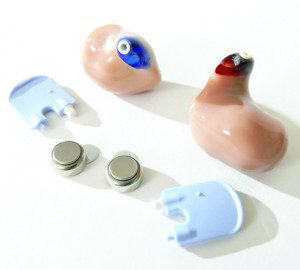By Dr. Noël Crosby, Au.D.
Hearing aid batteries are much more complicated than they look. A long-time hearing aid user may learn some useful things from this article.
 Hearing aids are designed to be small and light so that they can be worn behind, or even in the ear. Hearing aid batteries have thus been designed to be small and light. This allows the batteries to be a suitable source of electricity for todays small hearing aids. The battery technology best suited to produce light batteries is the zinc air battery. This battery allows for the greatest amount of power to be stored for a given weight. This can happen because it uses the oxygen in our air as part of a chemical process to produce electricity. Because no storage is required for this chemical inside the battery, it can be made lighter. Zinc air batteries are sealed when manufactured and have a very long shelf life. To use a zinc air battery, you have to remove the sealing tab from the tiny holes on the battery to let the air in. This starts the electricity producing chemical reaction. This chemical process allows the battery to provide a steady current over a period of time. Another important characteristic of Zinc-Air batteries is the way they discharge. Zinc-Air batteries don’t gradually fade. They work perfectly until they run out of the zinc that is part of the chemical reaction and then they die almost instantly. This is important for hearing aids, your hearing aid can’t weaken or malfunction due to a battery with a weak discharge. The hearing aid works with full power or it doesn’t work at all.
Hearing aids are designed to be small and light so that they can be worn behind, or even in the ear. Hearing aid batteries have thus been designed to be small and light. This allows the batteries to be a suitable source of electricity for todays small hearing aids. The battery technology best suited to produce light batteries is the zinc air battery. This battery allows for the greatest amount of power to be stored for a given weight. This can happen because it uses the oxygen in our air as part of a chemical process to produce electricity. Because no storage is required for this chemical inside the battery, it can be made lighter. Zinc air batteries are sealed when manufactured and have a very long shelf life. To use a zinc air battery, you have to remove the sealing tab from the tiny holes on the battery to let the air in. This starts the electricity producing chemical reaction. This chemical process allows the battery to provide a steady current over a period of time. Another important characteristic of Zinc-Air batteries is the way they discharge. Zinc-Air batteries don’t gradually fade. They work perfectly until they run out of the zinc that is part of the chemical reaction and then they die almost instantly. This is important for hearing aids, your hearing aid can’t weaken or malfunction due to a battery with a weak discharge. The hearing aid works with full power or it doesn’t work at all.
Because the process of oxygen absorption is not immediate, battery companies recommend that you wait two full minutes before inserting the battery into the hearing aid and closing the battery door. If you do not wait those two minutes, the battery may not have enough oxygen to power up and it can be starved for oxygen inside the hearing aid’s casing. This instruction can sometimes be seen on the battery packaging.
This tip is little known by hearing aid users and healthcare professionals. The fact that battery cells can be oxygen starved was not as likely in older model hearing aids so the issue was not often brought up. But newer hearing aids on the market are more air tight in an attempt to help reduce moisture related problems (sweat, humidity, water, rain).
How long should a hearing aid battery last? This is a difficult question to answer. The average life of a battery is five to seven days; however, there are many factors that can affect battery life. The more severe a person’s hearing loss, the harder a battery must work, which shortens its life. Hearing aids with all the bells and whistles may use more power, causing the battery to drain quicker. Low humidity will dry out the battery and high humidity can affect battery discharge. Low temperatures or high altitudes may cause lower battery voltage, thus affecting battery life.
I learned much of this information from my battery supplier. Being an audiologist, I am fortunate to be able to learn from all the industries that deal with hearing aids and hearing aid related products. I am pleased to be able to pass this information along to the general public and my patients.
PROFESSIONAL BIO
Dr. Noël Crosby, Au.D., owner and practicing audiologist at Advanced Hearing Solutions in Englewood, FL is an experienced professional whose career has been devoted to helping people of all ages hear and understand more clearly.
With over 23 years of experience, Dr. Crosby’s career path is marked by the pursuit of advanced education. After completing her undergraduate requirements, she received her Bachelor and Master of Science degrees from Florida State University and her Doctorate in Audiology from the University of Florida.
Her credibility as an authority grew during her tenure as the Director of Audiology at the Silverstein Institute in Sarasota, FL from 1991-1998. Today, in addition to managing a successful audiology practice, Dr. Crosby just completed her second term as president of The Florida Academy of Audiology.
941-474-8393 | www.drnoelcrosby.com









